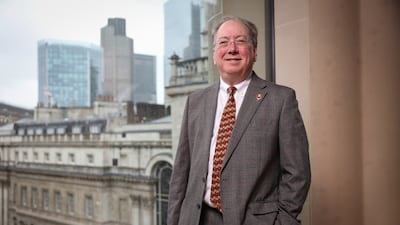Live updates: Follow the latest news on Cop28
When the UN’s Stefan Stiell declared on Wednesday that “Cop28 will be a finance Cop”, it was a message that seemed tailored for Michael Mainelli, the Lord Mayor of London.
Mr Mainelli travels to Dubai this weekend to play a prominent role in talks at the Cop Expo site.
The Lord Mayor, who represents the City of London, the financial centre of the British capital, has been working on climate and markets since the last century.
Having mapped the effects of climate change over his career, Mr Mainelli sees the challenge playing out across two uneasy strands: state subsidies and markets.
He will appear as a panellist in two Green Zone discussions: one on the state of transition finance, and one on growing trust in voluntary carbon markets, both at the EY Pavilion.
He has voiced hope that the markets, and particularly London traders – which are evolving as climate action players – can take a leading role in tackling carbon emissions, reducing the role of governments in these efforts.
“The situation is investable, and solvable,” he told The National.
“My focus, really, over the years, has been on finding ways to encourage long-term decisions by governments that are more stable [for the markets].”
In the 1980s, Mr Mainelli was creating groundbreaking maps, including a campaign to log environmentally sensitive areas around the world.
In the late 1990s, he was inspired by early emissions trading schemes, notably in the US, to work on the City's first shadow market to produce rules for contracts under English law, which were launched in 2005.
Now, Mr Mainelli serves as an ambassador for the market side in the race to net zero, which, he estimates, accounts for about a quarter of all efforts.
The sustainability drive can improve significantly as emerging solutions, such as hydrogen, are funded from the capital markets, he has said.
“I think there's a lot of potential there that people are certainly talking about and interested in,” he said.
Mr Stiell has also set better financing arrangements for developing countries as a priority for Cop28. “The reality is that without much more finance flowing to developing countries, a renewables revolution will remain a mirage in the desert,” he said.
“Cop28 must turn it into a reality.”
As well as creating new trading places, Mr Mainelli thinks markets can find new ways to reward governments' commitment to sustainability.
He cites the example of new bonds issued last year by Chile and Uruguay, aiming to finance the transition by promising lower interest rates if they hit their targets, but higher if the benchmarks are missed.
With Cop28's focus on ensuring a fair and just transition for the developing world, there will be calls for reparations or transfers from advanced economies – historically the main culprits in emissions – to finance poorer countries' efforts to meet targets, or to compensate for loss and damage.
The developed world has pledged $100bn in annual funding for developing nations.
However, Mr Stiell said that trillions would be needed, and Mr Mainelli also frames his argument in such terms. He sees voluntary carbon markets playing a key role.
“We do have to get voluntary to work, but it's going to be a 10-year programme,” Mr Mainelli said.
The Lord Mayor's Show - in pictures
“The other markets are already here, but they ought to be four times the size, which puts you closer to just under $3 trillion. You might see it as a $6 or $8 trillion market. If that was the case I think we could be solving it with market forces.”
London could yet be boosted by the huge subsidies directing the climate response in the US under President Joe Biden’s Inflation Reduction Act. Its traditional stand-alone international role also insulates it from the domestic gyrations of Prime Minister Rishi Sunak’s net-zero u-turns.
“If you look at offshore centres, or London historically, it's their stability of policy that sets them apart,” Mr Mainelli said.
“I think the UK probably is benefiting, because we're being seen, believe it or not, as a more stable policy home for a lot of these things.”
A backlash in the US against ESG-driven corporate sustainability policy in some Republican-governed states has only added to the economic and political pressures surrounding the drive for net zero by 2050. For Mr Mainelli, this underlines the perils facing businesses in transition.
“What is wanted when they produce net-zero steel or cement is, 'If I'm going to get the money for it or is my competition is going to be paying a much higher [carbon] price'.”









